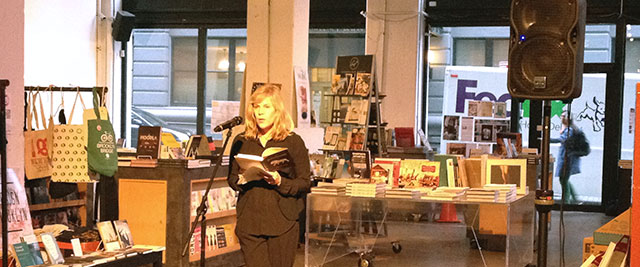
Amy Rowland once worked in a newspaper transcription office, a job since automated. But her time listening to dictated stories and interviews left her thinking about language and inspired her debut novel, The Transcriptionist. She read from the book at Powerhouse Arena.
Rowland landed a job as a newspaper transcriptionist a few weeks before September 11, 2001. The job immediately drained her; she had become “a human conduit for the news and the news was bad.” But it also meant she had an intimate relationship with the language of public discourse. She began thinking about that language and the inadequacy of it.
At the time, Rowland had another novel she had been working on. It featured a southern racist on deathrow written as an epistolary novel. The main character only ever spoke in the final pages of the book. She calls it a failed novel.
“I became interested in the newspapers as an institution and institutional memory,” she says.
Working as a transcriptionist began to take its toll. It was a job that required listening. Her mind began to wander while she worked, and she made mistakes. She once transcribed an interview where the subject said he watched foreign films for the signage. She transcribed the phrase as watching porno films for the signage. “I had to get out,” she says.
Rowland served as a transcriptionist at the end of an era. When she took the job, it was even then a vestigial position. Reporters thought of the transcription office as a mythical place. The novel is set in the early 2000s when language and the public image of language was manipulative. It was an era where language had become a tool of war.
Much of the novel occurs in the office setting. “The novel is about work,” she says. As she wrote it, she subconsciously made the workplace seem more surreal in order to distance herself from the news business that she was working in. So far her formal journalism colleagues have been supportive. “I didn’t think of it as being published or as having an audience,” she says about writing the novel.
Confined spaces play a major role in the novel. The transcription office serves as a kind of prison. But language is also a kind of prison, Rowland says. There is a physical reality of confinement as well as an intellectual and emotional confinement. Rowland says writing within this limited space eventually grew difficult and became a major challenge to overcome.
Rowland is working on a new novel. Its surreal, but grounded in reality. She says it features a baby falling from the sky.